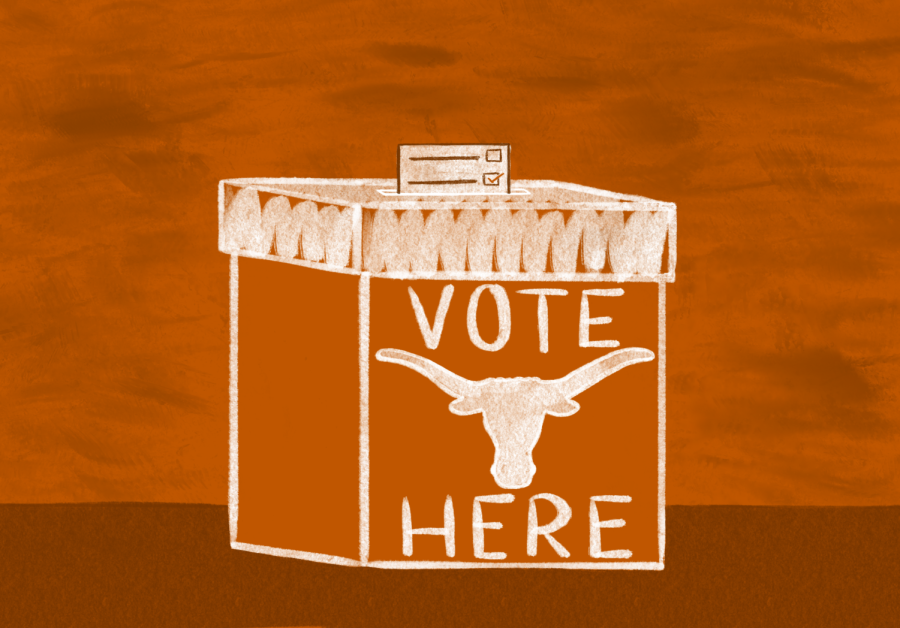An insider’s view of campus-wide elections
April 10, 2023
In February 2023, UT held its annual campus-wide elections. Generally, campus-wide elections allow undergraduate and graduate students to express their voices through Student Government. But falling participation rates have transformed this rosy ideal into an unrealized pipe dream.
Campus-wide elections are marginally fruitful at best and ineffective at worst. While the University touts SG as a centerpiece of student engagement, elections are marred by low voter turnouts. Elected representatives often receive flimsy support from a sliver of students — concentrating votes and perpetuating SG’s woes as a voice box for a select few.
Unfortunately, UT remains inefficient with its election advertisement. But the University should no longer accept low voter turnout rates while publicly praising SG. UT must leverage official University communication channels, like digital and on-campus networks, to vigorously publicize campus-wide elections and bolster student voter turnout.
This spring, I witnessed these issues firsthand as an Election Supervisory Board member. The ESB is a nine-member, student-led body that adjudicates legal disputes between candidates and oversees the planning, coordination and execution of the election cycle.
As a freshman ESB member, I was shocked to learn how few individuals were aware of campus-wide elections. I learned that out of more than 50,000 eligible students, relatively few have voted in past election cycles.
“I found out (about campus-wide elections) the day of, … which wasn’t that useful because I didn’t really know the candidates or their positions,” Paras Patel, a government and economics sophomore, said. “So I would definitely say the promotion techniques applied are inadequate at best. One email, especially when students are bombarded with so many emails, (is) not sufficient at all.”
Such a trend, while concerning, is hardly surprising. Aside from sending a campus-wide reminder email hours before the elections began, UT’s communication regarding this event was scant.
“It’s been, for the most part, (a) student-run election all the way up,” Marcus Mayes, a legislative student organization advisor, said. “When it comes to more of the administrative, technical things that maybe students can’t do, that’s where the University comes into play.”
While the Office of the Dean of Students must tread a fine line between administrative oversight and interference, minimally promoting student-run elections is disingenuous and borderline negligent.
The reality is that no single candidate enjoys the collective social reach of the University. The candidates cannot be reasonably expected to galvanize 50,000 students into civic action. By deferring substantive voter mobilization efforts to candidates, UT overlooks its influence and further erodes SG’s legitimacy.
UT can leverage several marketing strategies to rectify its inattentive stance on campus-wide elections. For one, the University should aggressively embrace its popular social media channels for stronger messaging to a wider audience. This could involve posts briefly detailing each candidate’s name and relevant information and periodic reminders to vote.
The University could then supplement these actions by tabling in high-traffic locations and posting visible signs in residence halls, buildings and campus walkways. UT could also send daily text reminders through an alert system in the weeks and days leading up to elections.
Taken together, these solutions could drastically increase the visibility of campus-wide elections and SG itself. Furthermore, each initiative can be implemented impartially while utilizing existing infrastructure.
Although much work is needed before SG can speak for all students, re-establishing institutional trust and breaking the cycle of apathy begins with University-led efforts to increase involvement in elections.
Make no mistake, SG is an inherently flawed organization. However, UT’s unwillingness to suitably amend the institution means SG is here to stay. Despite SG’s many bureaucratic deficiencies, the University is still responsible for inviting all students to the playing field.
Gokhale is an undeclared business freshman from Allen, Texas.










